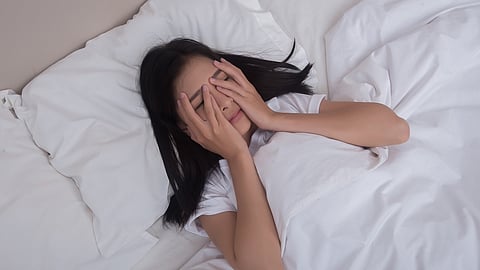

You’re just about to drift off when — bam! — your body jerks awake as if you just fell off a cliff. It’s jarring, sometimes even alarming, but completely normal. These sudden, involuntary muscle twitches, known as sleep spasms or hypnic jerks, happen to a lot of people.
“These are common and seen in around 60-70% of individuals. They occur very randomly and can affect people of all ages,” says Dr Y Muralidhar Reddy, senior consultant and head, department of neurology at Renova Century Hospitals, Banjara Hills. Most of the time, they’re harmless, but they can be unsettling — especially if they occur frequently.
The exact cause of sleep spasms isn’t always clear. However, certain factors can increase the likelihood of experiencing them. Some people even describe a sensation of falling, an electric shock, or brief hallucinations right before they happen. “Most do not have an identifiable cause. They can be triggered by extreme tiredness, sleep deprivation, stress and anxiety, and excessive consumption of brain stimulants such as caffeine and nicotine,” Dr Reddy explains.
For most, these twitches are nothing more than an occasional annoyance. But for some, they can be intense enough to wake them up multiple times a night. “These are characterised by an involuntary twitch of one or more muscles. These may be very mild, and the person experiencing them may not know them until a partner or caregiver notices them. On the other hand, they can be strong enough to make the person wake up. Feelings of electric shock or hallucination are also seen in some people,” the doctor expresses.
While sleep spasms are usually harmless, they can sometimes point to something more. “Frequent or severe spasms could indicate underlying issues such as restless legs syndrome, periodic limb movement disorder, epilepsy, or neurological disorders. If they are disruptive or worsening,
a medical evaluation is recommended,” warns Dr Viswesvaran Balasubramanian, consultant in interventional pulmonology and sleep medicine, Yashoda Hospitals.
Surprisingly, these sudden jolts can also be linked to sleep-related breathing problems. Conditions like chronic obstructive pulmonary disease (COPD) and asthma can also increase the risk of sleep spasms due to fluctuating oxygen levels. Dr Balasubramanian says, “Sleep spasms can sometimes be linked to sleep apnea. In obstructive sleep apnea (OSA), a lack of oxygen due to breathing interruptions may trigger muscle jerks as the body attempts to wake up and restore airflow. If you experience snoring, choking, or daytime fatigue, a sleep study might be necessary.”
So when should you be concerned? “Hypnic jerks are benign and not a sign of serious disease. However, some symptoms similar to hypnic jerks may warrant medical attention. Multiple, persistent contractions of muscles that spread to other parts of the body rapidly or jerking movements in deep sleep should warrant a doctor’s consultation, as these types of movements can be a sign of an underlying neurological disorder,” notes Dr Reddy.
The good news? Lifestyle changes can help, such as good sleep hygiene. Keeping the bedroom dark and quiet and avoiding screens before bed also makes a difference. “To minimise sleep spasms, consider managing stress through relaxation techniques like meditation or deep breathing. Avoid caffeine, nicotine, and alcohol, especially before bedtime. Maintain a consistent sleep schedule, exercise regularly but not too close to bedtime, stay hydrated and have a balanced diet,” advises Dr Balasubramanian.
If sleep spasms are becoming a problem, a sleep study might provide answers. “Sleep studies typically monitor the brain, heart, respiration, and muscle contractions. They can be performed to identify abnormal movements in sleep,” says Dr Reddy.
In some cases, medication may help. “Drugs which reduce anxiety and hypnotics (sleep-promoting drugs) can reduce sleep spasms,” he further adds.
Most of the time, sleep spasms are just a strange quirk of falling asleep — nothing to worry about. But if they’re keeping you up at night or making you feel exhausted during the day, it might be time to take a closer look. After all, a good night’s sleep is worth it.